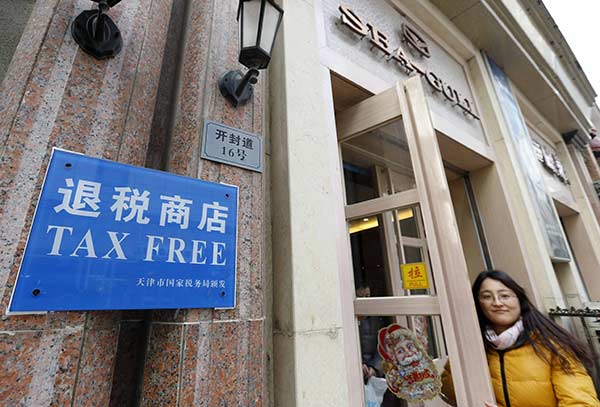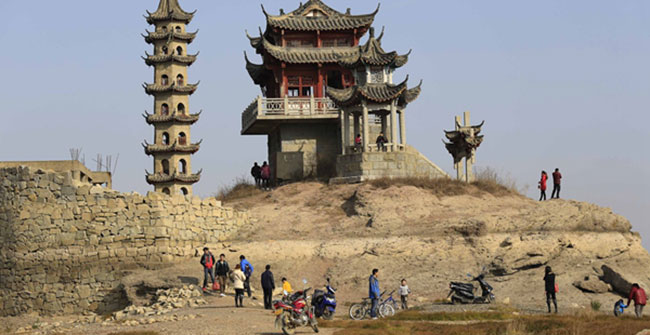Agency plans expansion of duty-free
By SU ZHOU (China Daily) Updated: 2016-01-30 08:13
 |
|
Thirty-four specific shops in Tianjin have provided tax refunds for foreign tourists since January. YUE YUEWEI/XINHUA |
Increased availability of tax refunds seen as way to boost spending and consumption by travelers
China hopes to unlock the potential of tourism consumption by establishing more duty-free shops.
Li Jinzao, head of the China National Tourism Administration, said on Friday that one of the major tasks in 2016 is to expand the tax refund policy to more cities to attract more overseas tourists and promote their consumption.
"At the same time, we will also explore opening more duty-free shops, expanding duty-free items and lifting the cap on duty-free purchases," added Li.
Offering tax refunds has long been a way for cities and countries to attract tourists and promote consumption. More than 50 countries and regions have tax refund policies, including the United States, Japan, South Korea, Canada, Brazil and Thailand.
China has followed and introduced ways for tourists to purchase duty-free goods.
For example, overseas visitors can claim a tax refund if they buy goods at designated stores in places like Beijing, Shanghai and Xiamen, Fujian province. Chinese tourists who traveled overseas can buy duty-free goods at airports.
In Hainan province, all tourists can purchase duty-free goods.
Wang Huiping, deputy director of Hainan's Department of Finance, said the duty-free policy has helped Hainan to build an "international tourism island".
Since the program kicked off in April 2011, Hainan's duty-free stores received more than 5.7 million customers who spent 16.5 billion yuan ($2.5 billion). In 2015, the sales volume reached 5.54 billion yuan.
"Hainan will further ease its duty-free policy for tourists by lifting the cap on shopping times and opening online duty-free shops starting from Feb 1," added Wang.
According to Hainan's new policy, nonresidents leaving the island can make duty-free purchases of up to 16,000 yuan a year with no limits on shopping trips. Previously, tourists could only use the duty-free shopping service twice.
"This change will further promote growth in both sales volume and the number of tourists who use the service."
Chen Lifen, associate research fellow of the Chinese Academy of International Trade and Economic Cooperation under the Ministry of Commerce, said the overseas shopping frenzy of Chinese tourists shows that consumption patterns have evolved and the domestic market cannot meet the demand.
Liu Simin, deputy director at the China Society for Future Tourism Studies, said the limited number of duty-free shops in China cannot meet the demand because of many requirements and limitations.
"Besides, the duty-free shops in China only remove tariffs. Value added taxes and consumption taxes are still there. So products in those shops don't have a price advantage over the places where they were produced."
'Toilet revolution' to improve standards
China will draft construction and sanitary standards for toilets in tourist areas and expects the majority of them to meet the standards by the end of the year.
Li Jinzao, head of the China National Tourism Administration, said the toilets include those at tourism attractions, as well as at transportation hubs, restaurants, entertainment zones and shopping malls that attract visitors.
"We will also collect feedback from tourists to help us supervise the 'toilet revolution'," added Li.
To promote the development of the tourism industry, the Chinese government has vowed to ensure that travelers and tourists don't frown when they have to answer nature's call in China.
A three-year campaign that started in January 2015 aims to build 33,000 restrooms across the nation by 2017 and renovate 24,000 facilities.
According to the plan, 25,000 toilets will be renovated or built in 2016.
Li said Internet technology such as mobile applications will be available to help tourists find nearby toilets.
- China penalizes 27 over wrongful conviction case
- Shenzhen vows public safety drive
- China to see 137m overseas tourists in 2016
- Xi bids New Year's greetings to non-communist parties, personages
- Xi urges grasp of China's strategic focuses
- Incentives needed to boost urbanization's full benefits
- Authority watchful to avert risk of Zika virus
- Education favorite of Chinese philanthropists
- Beijing encounters natural gas supply shortage
- Man convicted of abducting 22 children executed






